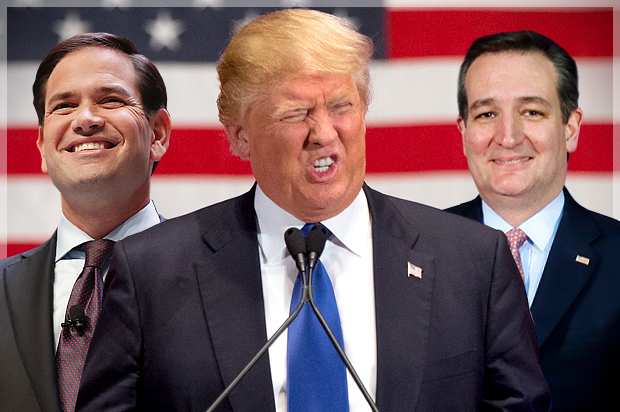Nevada Republicans will head to caucus locations today to select which of the remaining presidential candidates they’d like to receive the party’s nomination, and after all the caucusing is done the race will transition to a new phase. Up until today, candidates could set up shop in one state at a time and win votes through retail politicking: town halls, meet-and-greets, visits to local eating establishments, that sort of thing. For candidates with limited resources, this schedule has helped level the playing field a bit – John Kasich ensconced himself in New Hampshire for weeks on end and pulled out a second-place finish that kept his candidacy alive. But going forward, this sort of campaigning won’t work.
Starting on March 1, multiple states will be voting on the same day, which makes it pretty much impossible for a candidate to flesh-press his way toward a respectable delegate count. There are too many states in play and not enough time between contests to go from town to town and diner to diner looking to connect with voters. You have to mass communicate through TV, radio and large rallies. All those things cost money, and if you’re strapped for cash, you’re kinda screwed.
As the New York Times reported this week, the candidates who are best prepared money-wise for this new stage of the campaign are Ted Cruz and Donald Trump – Trump because of his vast personal fortune, and Cruz because of his army of grass-roots donors and relatively lean campaign spending (he raises a lot of money in small increments, and he started February with a very healthy $13 million on hand). As the Associated Press notes, Trump appears to have gotten a jump on his rivals in setting up organizations in the March states. And as Steve Benen explains, Cruz’s cash advantage gives him staying power, if nothing else.
Marco Rubio, on the other hand, was not as financially solid, starting February with just $5 million on hand. And it’s been lost in the wave of coverage surrounding his “momentum” and establishment backing, but Rubio’s non-win “wins” in Iowa and South Carolina have come at considerable expense. In South Carolina alone his campaign and super PACs spent $12 million on advertising, the second most by any candidate and far more than the $9 million Trump and Cruz spent combined. It’s not likely that Rubio will have to worry about money any time soon given the migration of Jeb Bush’s donors to the Florida senator’s camp, but that money brings with it another set of problems.
The backing of establishment bigwigs, billionaire donors and Wall Street heavyweights may be good for the bank account, but one of the hallmarks of this cycle has been antipathy toward candidates powered by establishment and big-donor money. Jeb Bush had a small army of establishment endorsers and a massive super PAC war chest fueled by huge donations, and it earned him little but scorn from the Republican electorate. At the same time, one of Trump’s biggest selling points has been that he “self-funds” his campaign (it isn’t actually true, though a lot of Trump’s funding does come out of his own pocket). Either way, Trump pitches himself to voters as being outside the influence of “special interest” types who try to buy candidates, and it works.
Rubio, on the other hand, looks very much like a candidate who’s being pumped up and kept alive by establishment support and special-interest money. According to Reuters, he’s far and away the biggest beneficiary of Wall Street donations this cycle, with over $4 million going to his campaign and super PACs. He had a clutch of billionaire donors backing his candidacy before Jeb’s flame-out freed up still more billionaires to jump to Team Rubio. Rubio definitely would much rather have their support than not, but it doesn’t come without drawbacks.
Those drawbacks become more pronounced if Rubio can’t put himself in position to actually win a state. Nevada polling, while sparse, has him trailing both Cruz and Trump. He’s not leading in any of the March 1 states for which any recent polling is available. Trump is way ahead in Michigan, and he also has a commanding lead in Rubio’s home state. Money and establishment backing don’t mean much if he doesn’t win, and the longer Rubio goes without notching a victory, the more he looks like an instrument of a Republican establishment intent on thwarting its own voters.

